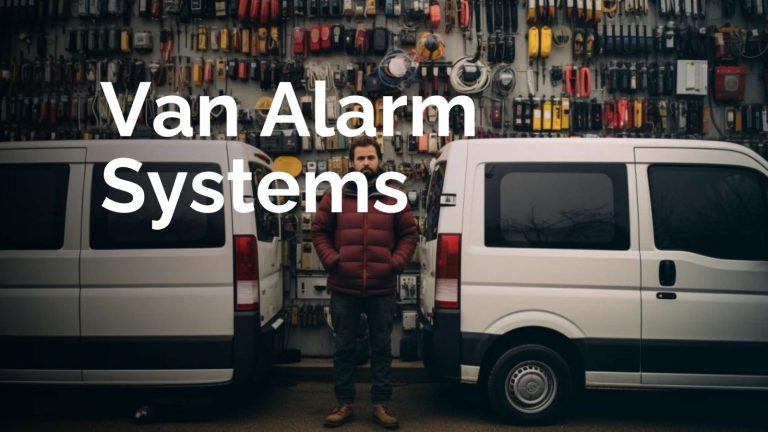

For camper van owners, protecting their vehicle is a top priority. Van alarm systems play a crucial role in providing this security. This section focuses on the basics and types of van alarm systems.
A van alarm system is a security device designed to protect vans from theft or break-ins. It typically includes sensors, a siren, and a control module that can be programmed to activate in response to specific events or conditions (HowStuffWorks). The sensors used in van alarm systems can detect a variety of events, including door or window opening, motion inside the van, changes in the vehicle’s angle, and changes in the vehicle’s voltage. These sensors are designed to trigger the alarm when they detect a potential break-in or theft (HowStuffWorks).
In addition to a van alarm system, camper van owners can enhance their vehicle’s security with other devices such as a van security lock, van security cameras, a van motion sensor alarm, or a van steering wheel lock.
Van alarm systems can be classified into two types: passive alarms and active alarms. Passive alarms automatically activate when the van is turned off and the doors are locked, while active alarms require the driver to manually activate the system (HowStuffWorks).
Moreover, there are two main types of van alarms: volumetric alarms and perimeter alarms. The volumetric alarm uses ultrasonic sensors and an air pressure sensor to protect the interior and exterior of the vehicle, while the perimeter alarm detects the opening of the bonnet, trunk, and doors of the vehicle to prevent break-ins. The perimeter alarm also has an anti-lifting system to detect towing and theft of the rims (Medium).
When choosing the best van alarm system, camper van owners should consider the type of detectors used in the system, such as ultrasonic motion sensors, air pressure sensors, and microwave technology detectors (Medium). By understanding the basics and different types of van alarm systems, you can make an informed decision and choose the best security system for your camper van.
When it comes to securing your camper van, it’s crucial to understand the key features of a van alarm system. These features, which typically include motion sensors, sirens, GPS tracking, and remote control capabilities, can provide robust protection for your vehicle and its contents.
Motion sensors are a standard feature in van alarm systems. These sensors can detect unusual movement within the vehicle, triggering an alarm if a potential break-in is detected. The alarm system has motion sensitivity management that eliminates false alerts, providing reliable security for the van and its contents (BABACO).
When the alarm system is triggered, it typically activates a loud siren or horn to attract attention and deter thieves. Some advanced systems may also send alerts to the owner’s smartphone or a remote monitoring station (HowStuffWorks). For more information on motion sensor alarms, check out our post on van motion sensor alarm.
GPS tracking devices can be integrated into van alarm systems, allowing you to locate and recover your camper van in the event of theft (The Van Conversion). Some alarm systems, like the BABACO® Van Alarm, can be integrated with GPS to provide real-time alarm notifications that can be sent to any email and directly to a cell phone. This allows for remote monitoring of the alarm system (BABACO).
Remote control capabilities are another key feature of many van alarm systems. This feature allows you to arm, disarm, and monitor your van’s security status from a distance (The Van Conversion). Advanced systems may offer additional features such as wireless operation, total vehicle disabling, sending signals to a mobile phone, and turning on interior and/or exterior lights (Medium).
In conclusion, the key features of a van alarm system can significantly enhance your vehicle’s security. By integrating motion sensors, sirens, GPS tracking, and remote control capabilities, you can ensure robust protection for your camper van.
Investing in a camper van security system is an important decision, and it’s crucial to choose a system that fits your unique requirements. This section will guide you through assessing your security needs and comparing different models to find the best van alarm system for your needs.
Before you can choose a van alarm system, you need to understand your security needs. These can vary based on a variety of factors such as the location where you typically park your van, the value of the items inside your van, and how often you use your van (The Van Conversion).
For instance, if you often park in high-crime areas or leave valuable equipment in your van overnight, you might need a more sophisticated alarm system. On the other hand, if you use your van for occasional trips and park in secure locations, a basic alarm system might be sufficient.
You should also consider any additional security measures you already have in place, such as a van security lock or van security cameras, as these can complement your alarm system and provide an extra layer of protection.
Once you’ve assessed your security needs, you can start comparing different van alarm systems. There are two main types of van alarms: volumetric alarms and perimeter alarms.
Volumetric alarms use ultrasonic sensors and an air pressure sensor to protect the interior and exterior of the vehicle. Perimeter alarms, on the other hand, detect the opening of the bonnet, trunk, and doors of the vehicle to prevent break-ins. They also have an anti-lifting system to detect towing and theft of the rims (Medium).
In addition to the basic alarm types, many van alarm systems can be customized with additional features like keyless entry and remote start (Engineers Who Van Life). These features can enhance the functionality and convenience of your alarm system, but they may also increase the cost.
When comparing different models, it’s important to read the user manual provided by the manufacturers. This can help you understand the features and capabilities of each alarm system and make a more informed decision.
Finally, remember to consider the brand and installation service. Choose a reputable brand and ensure that the alarm system is installed by specialized personnel to guarantee its efficiency (Medium).
In conclusion, choosing the right van alarm system is a process that requires careful consideration of your specific needs and a thorough comparison of different models. By taking the time to make an informed decision, you can ensure that your van is protected and secure at all times.
Installing a van alarm system can be a straightforward process with the right guidance. However, it’s important to be meticulous to ensure optimal functioning of the system. The process typically involves understanding the vehicle’s electrical circuit, disconnecting the battery, installing necessary components, and making the necessary connections.
Before starting the installation process, it’s crucial to have a clear understanding of your vehicle’s electrical circuit. This information is typically found in the vehicle’s manual. It’s also recommended to consult with a professional or do thorough research before choosing and installing a van alarm system to ensure it meets your specific security needs (The Van Conversion).
Another important step in preparation is to disconnect the negative terminal of the battery. This is to prevent any accidental shocks or short-circuits during the installation process.
Remember, it’s important to purchase a van alarm system from a reputable brand and consider having it installed by specialized personnel to ensure its efficiency (Medium).
Here is a general step-by-step guide on how to install a van alarm system:
Remember, these are general steps and can vary based on the specific alarm system and vehicle type. Always refer to the manufacturer’s instructions for precise installation steps (Medium).
Installing a van alarm system is a great way to enhance the security of your vehicle. However, it’s only one aspect of a comprehensive security plan. Consider additional security measures such as van security locks, van security cameras, and van steering wheel locks to further safeguard your investment.
Investing in a van alarm system offers a myriad of benefits, from deterring potential thieves to providing peace of mind for camper van owners.
The primary function of a van alarm system is to deter potential thieves from targeting your camper van. The presence of an alarm system sends a clear message to would-be intruders that your vehicle is secure, thus reducing the likelihood of a break-in (Medium).
An advanced van alarm system further heightens this security by offering features such as motion sensor alarms and security cameras. These systems may even come with remote control devices for keyless entry and constant contact with the van, further increasing its security (Medium).
In addition to a van alarm system, other security measures such as van security locks and steering wheel locks can be installed to provide an extra layer of protection.
Beyond the practical benefits, a van alarm system also provides a psychological benefit – peace of mind for owners. Knowing that your camper van is secure, particularly for those who live or travel in their vans, offers a sense of security that is invaluable (Engineers Who Van Life).
Additionally, the installation of a van alarm system is a proactive step towards protecting your van and its contents. This investment could potentially lower insurance premiums by demonstrating increased security measures (Engineers Who Van Life).
In a nutshell, a van alarm system not only provides practical security benefits but also contributes significantly to the overall peace of mind for camper van owners. It is a worthwhile investment that protects both your vehicle and your peace of mind.
While a van alarm system is a vital piece of equipment for any camper van owner, it’s crucial to understand potential challenges and solutions to ensure optimal use and avoid any inconvenience.
One common issue faced by camper van owners is compatibility. Not all alarm systems are compatible with every type of van or with all equipment within the van. For instance, one camper van owner found that their van alarm system was not compatible with a 220v generator (Sprinter-Source).
Before purchasing an alarm system, it’s important to ensure that it’s compatible with your specific vehicle model and the equipment you use. Check the product specifications, consult with the manufacturer, or seek advice from other camper van owners to avoid this issue.
In cases where a van alarm system may not be an option due to compatibility issues, consider other security measures such as a van security lock, van security cameras, or a van steering wheel lock.
Another challenge is managing false alarms. Alarm systems can sometimes be triggered accidentally, creating unnecessary stress and disturbance. This issue is often related to the sensitivity of motion sensors and other detectors.
To mitigate this challenge, look for a van alarm system with adjustable sensitivity settings. An alarm system that features motion sensitivity management can help eliminate false alerts, providing reliable security for the van and its contents (BABACO).
Moreover, understanding the types of sensors used in the system can be beneficial. The sensors can detect a variety of events, including door or window opening, motion inside the van, changes in the vehicle’s angle, and changes in the vehicle’s voltage (HowStuffWorks). By adjusting the sensitivity of these sensors, you can tailor the system to your specific needs and reduce the likelihood of false alarms.
In conclusion, while a van alarm system is an essential tool for securing your camper van, it’s important to be aware of potential challenges and solutions. By understanding these issues and knowing how to address them, you can ensure that your van alarm system provides effective and reliable security.

Michael Horsfall, a seasoned plumbing and heating engineer with over 35 years of trade experience, is the innovative mind behind VanGuardian, a proactive van security solution. His journey into the realm of security was triggered by recurrent incidents of theft, particularly copper pipe theft right from outside his residence in Leeds. The rampant van crimes led him to envision VanGuardian, a patented alarm system engineered to deter theft by activating upon contact, safeguarding assets before any damage occurs. Michael's in-depth understanding of the challenges faced by tradesmen, paired with his endeavor on Dragons' Den to secure investment, underscores his commitment to fostering van safety. His profound expertise and real-world experience equip him with a distinctive insight, making his blogs an invaluable resource for individuals seeking pragmatic advice on van safety and security.

Copyright © 2021 VANGUARDIAN
VANGUARDIAN is a registered trademark of PROTEK-ONE, company no. 11802780.
